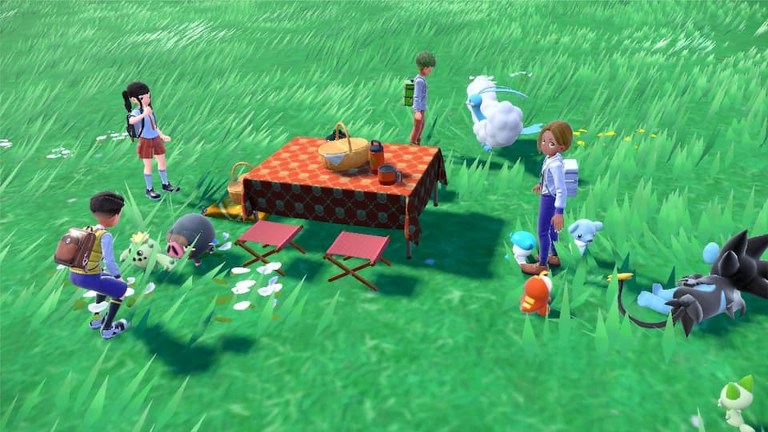Pokémon Scarlet and Violet: How to Breed Pokémon
Breeding has been a standard part of the Pokémon formula for generations, but Scarlet and Violet alter that mechanic in ways that may confuse players old and new.

One of the most reliable ways to min-max your Pokémon Scarlet and Violet experience is by utilizing the game’s breeding system. Historically, that mechanic lets players “Frankenstein” together stats, natures, and abilities to create the ultimate competitive monsters. However, Pokémon Scarlet and Violet give the system a slight facelift and introduce some changes you will need to know about.
In the past, players could breed Pokémon by leaving two Pokémon of opposite genders (or one Pokémon and one Ditto) in a Pokémon Day Care or Pokémon Nursery. If the Pokémon shared at least one “Egg Group” (e.g., classifications based on appearance, such as amphibious or humanoid), when players picked them up, the attendant would hand Trainers an egg.
Because of the often confusing nature of these egg group classifications, Pokémon you wouldn’t assume would be compatible actually were. That mechanic gave rise to many memes and fanfic pairings. Not only do Pokémon Scarlet and Violet add even more Pokémon of varying egg groups to memorize for breeding, but the games do away with the daycares and nurseries that used to be the centerpiece of that breeding system. As such, even veteran players are forced to unlearn much of what they originally knew about Pokémon breeding. Thankfully, the new system is a bit easier to use in the long run.
In order to start the breeding process in Scarlet and Violet, first make sure the Pokémon you want to lay an egg is in your party. As usual, the breeding Pokémon have to be of opposite genders and in compatible Egg Groups (or one of them needs to be a Ditto). Remember: the Pokémon you hatch will match the species of its mother or the non-Ditto participant. Make sure you’re using your desired pairing before you start.
Once you’re ready, you’ll need to set up a picnic. A grassy open plain or cliff overlooking the ocean are two excellent choices due to their romantic vistas, but in all honesty, any location that lets you set down a picnic table will do the job.
From there, all you have to do is wait. You can make a sandwich, bathe your team, or just stand around to kill time. Check the basket on the picnic table every so often, and you might find an egg in there. Don’t wait too long, though, since the basket can only hold 10 eggs at a time.
As usual, collecting an egg fills up a slot in your team, and if you already have a full roster, the game will automatically store the egg in your in-game PC. From there, the process of hatching eggs is completely unchanged. Just walk, run, and ride until it hatches. If you happen to have a Pokémon with the Flame Body ability, the egg will hatch faster.
Since the actual breeding process is now the result of RNG luck while picnicking, you might wonder if there’s any way to improve your odds. Thankfully, there is. Eating food that provides the Egg Power buff increases the odds of finding an egg in the basket while picnicking. Those foods include Peanut Butter, Marmalade, Tropical, and Fruit Sandwiches.
On paper, this new system sounds like an upgrade, and, for the most part, it is. However, it does come with one Steelix-sized caveat. When starting a picnic, any Pokémon on your person that can breed will breed. That means that if you have a full team of six creatures, three male and three female, and they all share at least one Egg Group, then prepare to receive a carton of eggs with wildly varying stat, nature, and ability combos. The only way to breed an egg with a specific build is by picnicking with no more than two Pokémon in your party. Let’s hope you don’t run into any powerful enemies along the way.
While you’ll gradually pick up on some subtleties of the breeding process that will likely help expedite the process a bit more, those are the basics of breeding in Pokémon Scarlet and Violet. Hopefully, you’ll eventually get the Pokémon you’re looking for.
